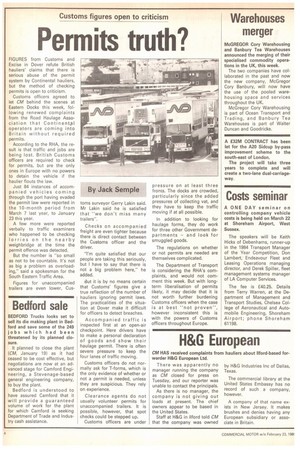Permits truth?
Page 6

If you've noticed an error in this article please click here to report it so we can fix it.
By Jack Semple
FIGURES from Customs and Excise in Dover refute British hauliers' claims that there is serious abuse of the permit system by Continental hauliers, but the method of checking permits is open to criticism.
Customs officers agreed to let CM behind the scenes at Eastern Docks this week, following renewed complaints from the Road Haulage Association that Continent,a1 operators are coming into Britain without required permits.
According to the RHA, the result is that traffic and jobs are being lost. British Customs officers are required to check for permits, but are the only ones in Europe with no powers to detain the vehicle if the haulier flouts the law.
Just 84 instances of accompanied vehicles coming through the port having evaded the permit law were reported in the 10-month period from March 7 last year, to January 23 this year.
A few more were reported verbally to traffic examiners who happened to be checking lorries on the nearby weighbridge at the time the permit offence was detected.
But the number is -so small as not to be countable. It's not as big a problem as overloading," said a spokesman for the South Eastern Traffic Area.
Figures for unaccompanied trailers are even lower, Cus toms surveyor Gerry Lakin said. Mr Lakin said he is satisfied that "we don't miss many trailers".
Checks on accompanied freight are even tighter because there is direct contact between the Customs officer and the driver.
"I'm quite satisfied that our people are taking this seriously, but I have to say that there is not a big problem here," he added.
But it is by no means certain that Customs' figures give a true reflection of the number of hauliers ignoring permit laws. The practicalities of the situation at Dover make it difficult for officers to detect breaches.
Accompanied traffic is inspected first at an open-air checkpoint. Here drivers have to make a personal declaration of goods and show their haulage permit. There is often severe pressure to keep the four lanes of traffic moving.
Customs officers do not normally ask for T-forms, which is the only evidence of whether or not a permit is needed, unless they are suspicious. They rely on experience.
Clearance agents do not usually volunteer permits for unaccompanied trailers. It is possible, however, that spot checks could be stepped up.
Customs officers are under pressure on at least three fronts. The docks are crowded, particularly since the added pressures of collecting vat, and they have to keep the traffic moving if at all possible.
In addition to looking for haulage forms, they do work for three other Government departments — and look for smuggled goods.
The regulations on whether or not permits are needed are themselves complicated.
The Department of Transport is considering the RHA's complaints, and would not comment this week. But with longterm liberalisation of permits likely, it may decide that it is not worth further burdening Customs officers when the case is at best "not proven", however inconsistent this is with the powers of Customs officers throughout Europe.




















































































